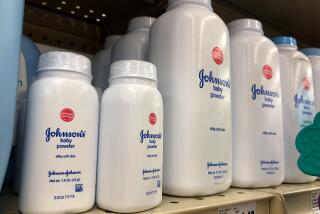J&J; Unit Must Bear $100-Million Cost : Judge Backs Insurers on Tylenol Recall
- Share via
NEWARK, N.J. — A Johnson & Johnson subsidiary, and not the company’s insurance carriers, must pay for the $100-million recall of Tylenol capsules that followed the cyanide deaths of seven people in 1982, a judge ruled Wednesday.
The insurance policies for the subsidiary, McNeilab Inc., did not cover the $100-million pretax costs, and J&J; had decided not to buy recall insurance, U.S. District Judge Maryanne Trump Barry said.
“If there is a basis for an appeal, we will pursue it,” said Robert Kniffin, spokesman for the New Brunswick, N.J.-based health-care giant.
Larry Feinberg, a first vice president with Dean Witter Reynolds in New York, said the ruling will have no impact on the company because it had set up a reserve to pay for the voluntary withdrawal.
The company is considered strong financially, and Feinberg said that next year J&J; probably will generate $500 million in excess cash.
The ruling also will have no bearing on the $150-million Tylenol recall of February, 1986, because as of Jan. 1 the company carried no outside liability coverage, citing the difficulty of obtaining such policies.
After the February death of a New York woman who took a cyanide-laced Extra-Strength Tylenol capsule, the company stopped manufacturing all capsule forms of over-the-counter medications.
In 1982, it recalled 22 million bottles of Extra-Strength and Regular Strength capsules after seven people died from taking Extra-Strength Tylenol capsules tainted with cyanide in the Chicago area.
The $100-million recall effort represented what J&J; spent on media messages warning the public about the tamperings, obtaining the recalled products and testing and destroying the capsules, J&J; Chairman James E. Burke has said.
The judge, in her ruling in the lawsuit brought by J&J;, said the company cannot “pass the buck” to the insurers for the 1982 withdrawal.
J&J;’s recall, undertaken from Sept. 30 to Oct. 7, 1982, “was caused not by its liability but by its desire to prevent further deaths, to alleviate fear and, less altruistically, to restore Tylenol to its pre-eminent position,” the judge wrote.
J&J; regained its market share after the recall and eventually exceeded it. McNeilab encompasses two other J&J; subsidiaries, McNeil Consumer Products Co., which manufactures Tylenol, and McNeil Pharmaceutical.
J&J; contended that the language of its excess-liability insurance policies clearly covered the withdrawal and related expenses.
But the judge noted that recall insurance was available and that J&J; had purchased such coverage but let it expire because the cost was prohibitive.
“We again return to one rock hard fact: Johnson & Johnson knew it could purchase recall insurance and elected not to do so,” Judge Barry wrote in a 77-page opinion.
The carriers named in the lawsuit were North River Insurance, Transit Casualty, Employers Insurance of Wausau, Aetna Casualty & Surety, American Centennial Insurance, Granite State Insurance, First State Insurance and Northbrook Excess & Surplus Insurance.
More to Read
Inside the business of entertainment
The Wide Shot brings you news, analysis and insights on everything from streaming wars to production — and what it all means for the future.
You may occasionally receive promotional content from the Los Angeles Times.










